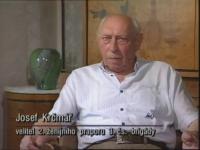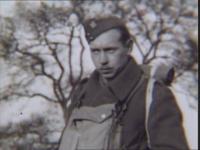Nowadays my grandson doesn’t understand why I went to get myself killed in the war.
Josef Krčmář was born in 1917 in the east Bohemian village of Česká Rybná. After the Protectorate of Bohemia and Moravia was established, he left for Poland, then France, where he joined the newly formed Czechoslovak Foreign Army. He underwent training in France in the town of Agde. After the French capitulation, he was transferred by boat to Great Britain. In 1944 he was redeployed to the Eastern Front to command a sapper battalion during the Carpatho-Dukla Operation.


